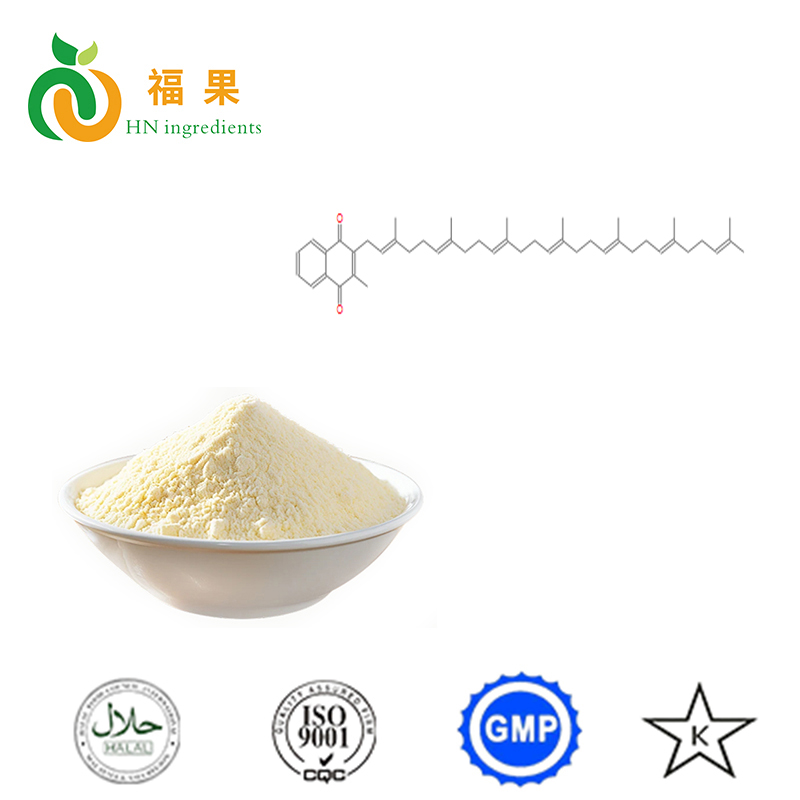
Vitamin K was first discovered in 1929 by Danish biochemist Henrik Dam, who named it "Koagulationsvitamin" for its essential role in blood clotting. The natural forms of Vitamin K include Vitamin K1 (phylloquinone) and Vitamin K2 (menaquinone). Vitamin K2 MK-7, characterized by its seven-isoprene-unit side chain, offers a superior half-life and higher bioavailability compared to other forms.
Japan pioneered the development and use of Vitamin K2, largely attributed to their traditional fermented food natto. In 2001, Japan became the first country to approve Vitamin K2 as a treatment for osteoporosis. The European Food Safety Authority also recognized MK-7's high bioavailability and benefits for bone and cardiovascular health in 2009.
Vitamin K2 MK-7 is primarily produced through microbial fermentation using strains such as Bacillus subtilis and Bacillus natto.
Production techniques have advanced significantly. For example, Jiangxi Agricultural University optimized the fermentation conditions for Bacillus subtilis DC-1, achieving an MK-7 yield of 94.66 mg/L—a 48.04% increase from initial conditions. Another study employed genetic engineering to enhance Bacillus natto, resulting in a 1.26-fold increase in MK-7 production.
China has emerged as a dominant player in the global supply chain, accounting for over 70% of the world's MK-7 production capacity.
The primary function of Vitamin K2 MK-7 is the precise regulation of calcium metabolism, which it achieves through two key mechanisms:
Activation of Osteocalcin: Osteocalcin, secreted by osteoblasts, requires Vitamin K2 for carboxylation. This process enables osteocalcin to bind calcium and incorporate it into the bone matrix, thereby enhancing bone density.
Activation of Matrix Gla Protein (MGP): When activated by Vitamin K2, MGP acts as a potent inhibitor of vascular calcification, thus supporting cardiovascular health.
Clinical studies have shown that daily supplementation with 180μg of MK-7 can significantly reduce the risk of vertebral fractures in postmenopausal women and slow the progression of carotid artery atherosclerosis. Additionally, MK-7 has demonstrated potential benefits in improving insulin sensitivity and supporting gum health.
The global Vitamin K2 market was valued at approximately $280 million in 2023, with the MK-7 segment accounting for 65% of the market share. Projections indicate that the market will grow to $520 million by 2028, reflecting a compound annual growth rate (CAGR) of 13.2%.
Regional market characteristics include:
Europe is the largest consumer market, holding a 42% share of the global market.
North America is experiencing rapid growth.
The Asia-Pacific region, particularly China, shows immense potential, with an annual growth rate exceeding 20%.
In terms of applications, bone health supplements dominate, comprising about 55% of the market, while cardiovascular health products account for 30%. The growing aging population worldwide is expected to sustain demand for MK-7 in osteoporosis and atherosclerosis prevention.
With accumulating clinical evidence and rising consumer health awareness, the applications of Vitamin K2 MK-7 are expected to expand into new areas, such as chronic kidney disease and neurodegenerative disorders.
Future developments will likely focus on advancements in fermentation technology to improve efficiency, alongside innovations in formulations and combination products (e.g., with Vitamin D) to meet diverse health needs. In summary, Vitamin K2 MK-7, with its proven dual benefits for bone and cardiovascular health, is poised to play an increasingly vital role in the global nutrition and health market.